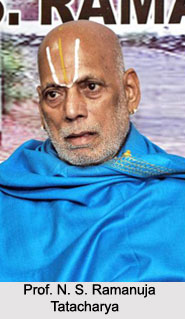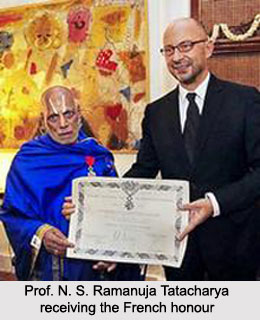 Prof. N. S. Ramanuja Tatacharya is one of the senior most and most renowned Indian scholars of Sanskrit. He was awarded the degree of "Chevalier" (Knight) in the French National Order of the Legion of Honour by the Government of France, the Padma Shri, India"s fourth highest civilian honour and most recently the Padma Bhushan, India"s third highest civilian honour by the Government of India in 2016 for his contribution to the field of Sanskrit literature and education.
Prof. N. S. Ramanuja Tatacharya is one of the senior most and most renowned Indian scholars of Sanskrit. He was awarded the degree of "Chevalier" (Knight) in the French National Order of the Legion of Honour by the Government of France, the Padma Shri, India"s fourth highest civilian honour and most recently the Padma Bhushan, India"s third highest civilian honour by the Government of India in 2016 for his contribution to the field of Sanskrit literature and education.
Education and Academic Services of Prof. N. S. Ramanuja Tatacharya
Born on April 15, 1928, in Navalpakkam village in the North Arcot district of Tamil Nadu to N. S. Krishnaswamy Tatacharya and Rajalakshmi, Prof. N. S. Ramanuja Tatacharya is very active in his Shastric pursuits. He studied under his father and Devanatha Thathachariar Swami. A Siromani (with a First Class) from the Madras University, Prof. Ramanuja Tatacharya was a full fledged "Naiyayika" by the age of 16. He was the first Vice-Chancellor of Rashtriya Sanskrit Vidyapeetha in Tirupati. Every scholastic journey led him to further voyages of discovery. He was a researcher at the French Institute of Pondicherry in Puducherry. He is fluent in the Sanskrit, Tamil, Telugu, Hindi and English languages. As an erudite scholar in Sanskrit, Prof. Ramanuja Tatacharya has served the academic community in different capacities that include his services as the Principal in charge of Kendriya Sanskrit Vidyapeeth, Tirupati and the Vice-Chancellor at the Rashtriya Sanskrit Vidyapeetha.
Works of Prof. N. S. Ramanuja Tatacharya
 Prof. N. S. Ramanuja Tatacharya has to his credit more than 15 reputed published works in classical Indian philosophical literature. His original contributions in the area may be assessed from various scholarly works such as "Vivriti", "Balabodhini", "Bhagavadgunaratnapetika", "Pratyaksa Tattvacintamani Vimarsa" and others. He has translated "Nyayasiddhanjanam" of Vedantadesika into Tamil. He has also been the general editor to many scholarly works like "Ramanujacaritacampu", "Pancapadikavivarana with Commentaries" (reprint) and "Caturdasalaksani". Besides, he has also contributed in more than 60 research papers on the different "Shastras", which have been published in various research journals. Dr. Tatacharya has guided more than 25 research scholars in PhD, on different aspects of Sanskrit Literature, Philosophy and Indian Culture. He has also guided many scholars from foreign countries in their research assignments.
Prof. N. S. Ramanuja Tatacharya has to his credit more than 15 reputed published works in classical Indian philosophical literature. His original contributions in the area may be assessed from various scholarly works such as "Vivriti", "Balabodhini", "Bhagavadgunaratnapetika", "Pratyaksa Tattvacintamani Vimarsa" and others. He has translated "Nyayasiddhanjanam" of Vedantadesika into Tamil. He has also been the general editor to many scholarly works like "Ramanujacaritacampu", "Pancapadikavivarana with Commentaries" (reprint) and "Caturdasalaksani". Besides, he has also contributed in more than 60 research papers on the different "Shastras", which have been published in various research journals. Dr. Tatacharya has guided more than 25 research scholars in PhD, on different aspects of Sanskrit Literature, Philosophy and Indian Culture. He has also guided many scholars from foreign countries in their research assignments.
Awards and Recognitions received by Prof. N. S. Ramanuja Tatacharya
As an eminent scholar, Prof. N. S. Ramanuja Tatacharya has been recognised with many awards and recognitions, which include:
•Catussastra Praveena by the Sanskrit Sahitya Praishat, Tiruchi in 1981
•Maha Mahopadhyaya by the Rashtriya Sanskrit Vidyapeetham, Tirupati in 1996
•Vacahaspati Puraskar by the K. K. Birla Foundation with 1 Lac Indian Rupees in 2001
•The "Chevalier" degree of the Order of the Legion of Honour by the Government of France, in recognition to his outstanding contribution to Sanskrit studies, in 2012
•The Viswabharati Award by the Government of Uttar Pradesh, in 2013
•The Padma Bhushan, India"s third highest civilian honour by the Government of India for his outstanding contribution in the field of Sanskrit Literature and Education, in 2016



















